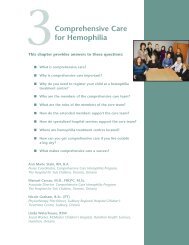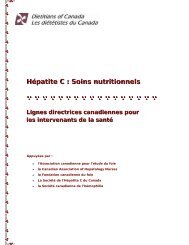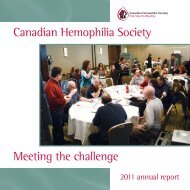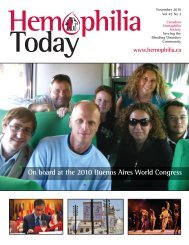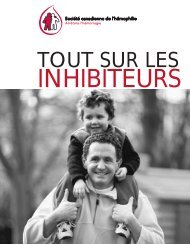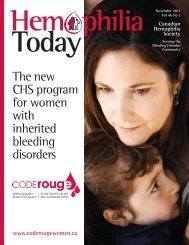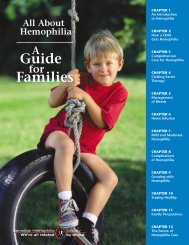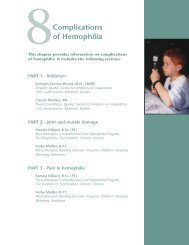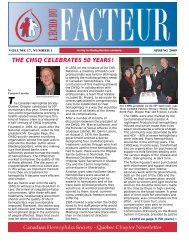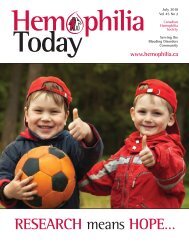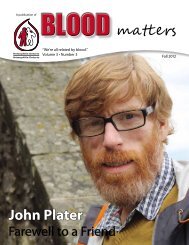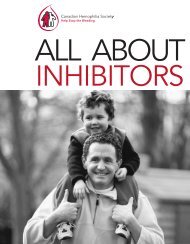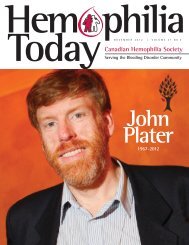BLOOD matters - Société Canadienne de l'Hémophilie
BLOOD matters - Société Canadienne de l'Hémophilie
BLOOD matters - Société Canadienne de l'Hémophilie
You also want an ePaper? Increase the reach of your titles
YUMPU automatically turns print PDFs into web optimized ePapers that Google loves.
the 1980 Olympics in sailing. My Dad<br />
helped me buy a Flying Dutchman<br />
class sailboat and I started dragging<br />
it around the continent going to regattas<br />
to train for the Olympic Trials<br />
to be run in the spring of 1980 to <strong>de</strong>termine<br />
who would be on the Canadian<br />
Olympic Sailing Team. Half way<br />
through those trials, the Americans<br />
and most of their allies announced<br />
that they would be boycotting the<br />
Moscow games because of Soviet<br />
military involvement in Afghanistan,<br />
and so en<strong>de</strong>d my Olympic dreams.<br />
Ironically, we and the Americans are<br />
there now doing pretty much the<br />
same thing the Soviets were trying<br />
to do 30 years ago.<br />
As I was preparing to go back<br />
to university in the fall of 1980, I<br />
noticed an enlarged and hypersensitive<br />
testicle. Thinking this must be<br />
somehow related to my hemophilia,<br />
I treated it with the then novel product<br />
known as freeze-dried Factor<br />
VIII concentrate. After a few weeks<br />
I was cajoled by my girlfriend to go<br />
see a urologist. I never ma<strong>de</strong> it back<br />
from the hospital. They whisked me<br />
into surgery to excise the offending<br />
organ and biopsy it. I was diagnosed<br />
with Embryonal Cell Carcinoma,<br />
an incredibly aggressive cancer that<br />
kills 95 percent of patients within a<br />
month. Cancer was on everybody’s<br />
minds and tongues at that time. Terry<br />
Fox was half-way through his historic<br />
run across the country and had visited<br />
Toronto a scant few weeks before.<br />
My Dad told me that I probably had<br />
a couple of weeks to live. Luckily, my<br />
oncologist knew better. There was a<br />
new drug, cis-platinum, which was<br />
barely a few months old and indications<br />
were that it was effective in a<br />
chemotherapeutic cocktail on this<br />
type of tumour. This is the second<br />
instance of extraordinarily fortunate<br />
timing in my life. Needless to say, the<br />
new therapy saved me, as it now does<br />
some 70 percent of patients with the<br />
kind of tumour I had.<br />
The next few years went by without<br />
inci<strong>de</strong>nt. Surviving cancer gave<br />
me an entirely new outlook on life.<br />
Whereas, up to that point, I had more<br />
or less cruised through school and<br />
most of my activities, after the close<br />
call with <strong>de</strong>ath (and constantly living<br />
with the spectre of relapse hanging<br />
over me), I attacked life and all of its<br />
aspects with increased <strong>de</strong>termination<br />
and verve. I went back to university<br />
<strong>de</strong>termined to be the best stu<strong>de</strong>nt in<br />
the class (which didn’t happen, but<br />
I tried). I became intent on going to<br />
a top-flight school to do a Ph.D. and<br />
worked single-min<strong>de</strong>dly to that end. I<br />
spent my summers working in professors’<br />
labs, and nights studying har<strong>de</strong>r<br />
and har<strong>de</strong>r to bring my marks to the<br />
highest level of which I was capable.<br />
I was rewar<strong>de</strong>d for this effort with a<br />
spot in the physics Ph.D. program at<br />
Massachusetts Institute of Technology<br />
(MIT). During my un<strong>de</strong>rgraduate<br />
studies I met Ann Harrington, the<br />
nurse coordinator of the new comprehensive<br />
care clinic for hemophilia<br />
at St. Michael’s Hospital in Toronto. I<br />
also met Drs. Jerry Teitel and Berna<strong>de</strong>tte<br />
Garvey, and very gladly han<strong>de</strong>d<br />
my care into their capable hands.<br />
Now we get to the part of the story<br />
that is common ground for all severe<br />
hemophiliacs in Ontario and in<strong>de</strong>ed<br />
most of North America and Europe.<br />
In my case, D-Day was December 20,<br />
1985. I was in Toronto for Christmas<br />
break at the end of the first term of<br />
the second year of my Ph.D. studies.<br />
I had just had a tumour marker assay<br />
and a final visit with my oncologist,<br />
and was <strong>de</strong>clared cured of the terrible<br />
cancer I had contracted five<br />
years earlier. On that basis, and with<br />
that great news in hand, I proposed<br />
that morning to my girlfriend. We<br />
had both been a little trepid about<br />
proceeding with marriage if the<br />
cancer issue was unresolved. Now<br />
that was behind us. She accepted my<br />
ring! Later that same day, I had what<br />
I thought was going to be a routine<br />
checkup at St. Mike’s with the hemophilia<br />
team there. Then the bomb<br />
dropped. I (and in<strong>de</strong>ed virtually all<br />
of the patients of the clinic) had been<br />
infected with HIV. As many of you<br />
will recall, at that time HIV was prob-<br />
ably the most feared and loathed illness<br />
on earth. People routinely killed<br />
themselves when they found out they<br />
had it. It was universally assumed to<br />
be highly contagious and lethal in all<br />
cases. The people who had it became<br />
social pariahs, often ostracized by<br />
their communities. Young hemophiliacs<br />
all over the world were asked not<br />
to come to school. In extreme cases<br />
violence was perpetrated on HIVpositive<br />
people, including children.<br />
People’s houses were burned down<br />
(I happened to be friends with Ricky,<br />
Robert and Randy Ray, who were<br />
all campers at a hemophilia camp I<br />
volunteered at in central Florida during<br />
the ’80s, and whose house was<br />
burned in an attempt to drive them<br />
out of town). People lost their jobs.<br />
People lost their lovers and spouses,<br />
and couldn’t find new ones. It was a<br />
truly horrible time, as those of us who<br />
lived through it remember so well.<br />
My fiancée <strong>de</strong>ci<strong>de</strong>d to stay with<br />
me, which was a great relief, and we<br />
were married in June, 1987. As the<br />
’80s wore on and many hemophiliacs<br />
around the country started to show<br />
signs of full blown AIDS, I carried on<br />
with my studies, a post doctorate and<br />
finally lan<strong>de</strong>d a professor position at<br />
a major university, all while waiting<br />
for what seemed to be the inevitable.<br />
Probably the most challenging aspect<br />
of this illness, at least for me as a<br />
Blood Matters Fall 2010 /5<br />
Hemophilia Ontario



